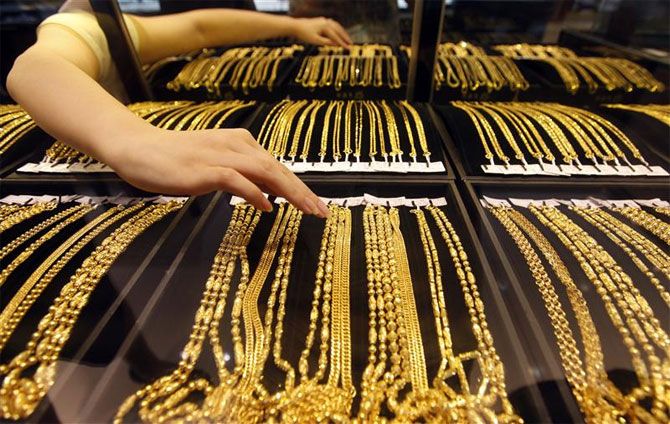The Modi government's decision to demonetise Rs 500 and Rs 1,000 banknotes will drive up interest in the bullion market, reports Rajesh Bhayani.
 With demonetisation of Rs 500 and Rs 1,000 notes, bullion dealers expect gold jewellery demand to go up for a few days and cash business of jewellers may increase.
With demonetisation of Rs 500 and Rs 1,000 notes, bullion dealers expect gold jewellery demand to go up for a few days and cash business of jewellers may increase.
Jewellers could show backdated cash sales. Veteran bullion dealers say that those who have cash in hand on their books could also buy such notes at a discount and deposit it in banks later on.
"The move will potentially create a surge in demand for gold jewellery for the next few days while the backdated bills would be made to show the transactions as genuine," Sudheesh Nambiath, lead analyst — precious metals demand, GFMS, Thomson Reuters said
Another bullion dealer said jewellers and diamond traders usually show bills while depositing cash generated by sales every week.
In cases where very high value deals happen in cash, they split bills in smaller amounts or cite stolen PAN numbers in those bills.
"Prime Minister Narendra Modi played the Morarji Desai card,” said a veteran bullion dealer. "In January 1978, all high-denomination banknotes (Rs 1,000, Rs 5,000, and Rs 10,000) were demonetised or withdrawn from circulation to curb unaccounted money."
"In those days," he recalled, "traders who were having cash on hand on their books had accepted high value notes even after they were withdrawn because they had facility to deposit them in the banks."
"In bullion market such notes were sold for 30 per cent discount and those who bought were having arrangements to deposit them in banks, officially showing cash business. But those who could not exchange notes or sell them at discount were forced to use them as tissue paper" he added. In 1978, the then Janata Party government had issued an ordinance demonetising high value currency notes to unearth black money.
The idea of terrorism and currency wars was not common till then. Smuggling was at its peak. Later an Act called The High Denomination Bank Notes (Demonetisation) Act, 1978 was passed to give legal status to the withdrawn notes.
Veterans say that Rs 1,000 and Rs 10,000 banknotes, which were in circulation, were demonetised in January 1946, primarily to curb unaccounted money.
Later, higher denomination banknotes of Rs 1,000, Rs 5,000 and Rs 10,000 were reintroduced in 1954.










